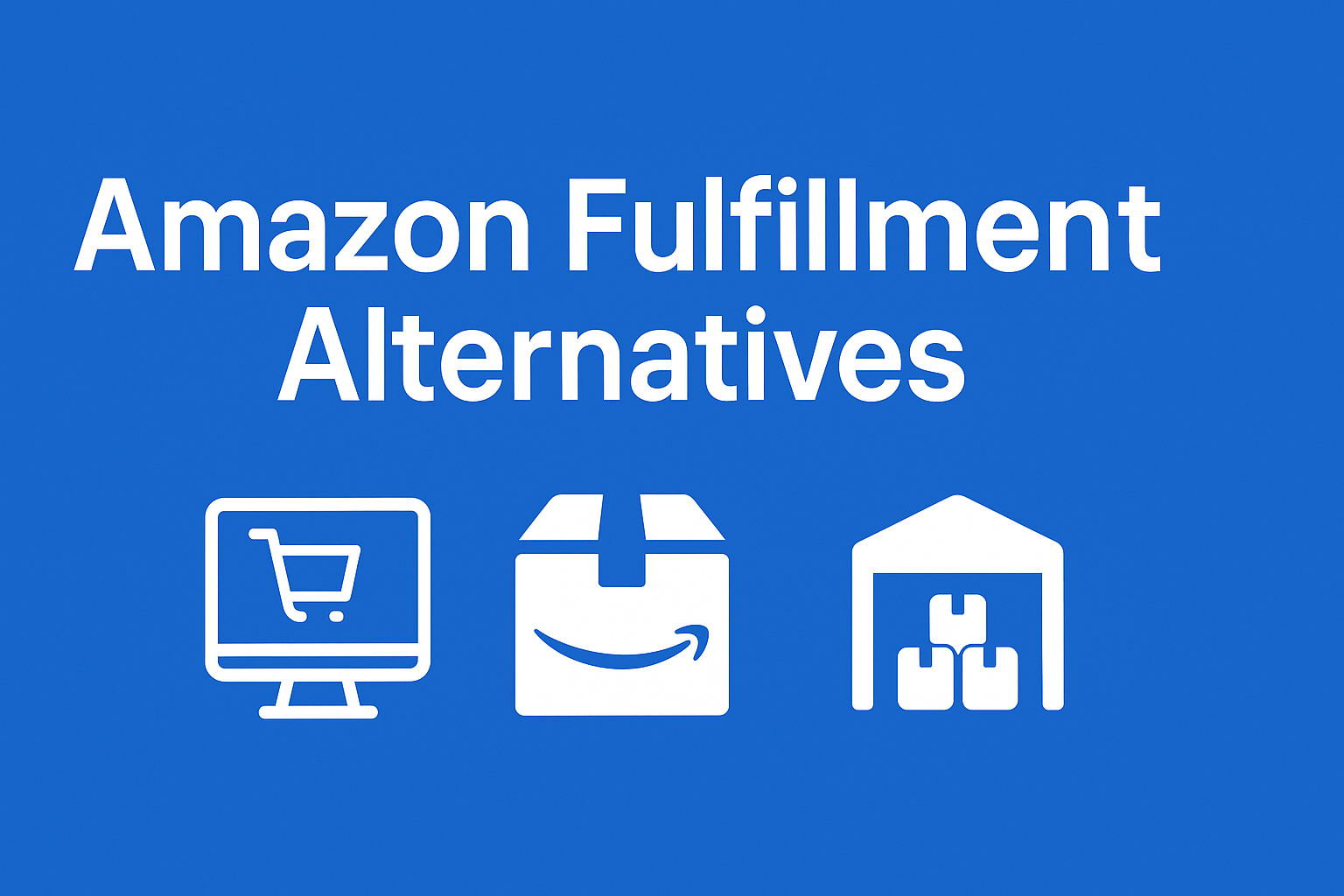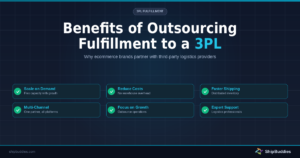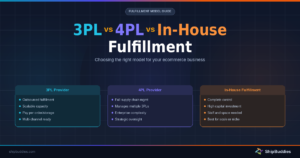Amazon’s Fulfillment by Amazon (FBA) program has long been the go-to choice for many sellers thanks to its Prime eligibility, broad reach, and hands-off logistics. It offers convenience, access to Amazon’s massive customer base, and streamlined delivery, but it comes at a cost. High fees, limited branding control, strict storage limits, and rigid restock policies have prompted many sellers to explore more flexible and cost-effective alternatives.
For growing ecommerce businesses looking to expand their brand beyond Amazon’s framework, there are other viable fulfillment models worth considering. Seller-Fulfilled Prime (SFP), Fulfilled by Merchant (FBM), and third-party logistics (3PL) providers each offer a different approach to order fulfillment. One that can give sellers greater control, better margins, and a more tailored customer experience.
In this article, we’ll break down the key differences between these Amazon FBA alternatives, highlight the benefits and challenges of each, and help you determine which fulfillment strategy best aligns with your business goals. Whether you’re scaling your brand or seeking more control over your logistics, this guide will provide a clear comparison to help you choose the right path forward.
Understanding the Limitations of Amazon FBA
Amazon FBA is undeniably powerful for order fulfillment, offering access to Prime customers, fast delivery, and reduced day-to-day logistics for sellers. However, its benefits come with trade-offs that can limit a seller’s control, flexibility, and profitability, especially as businesses scale or diversify across multiple channels.
Here are some of the most common limitations that lead sellers to consider alternatives:
High Fulfillment and Storage Fees
FBA fees can significantly eat into your margins, especially if your products are oversized, slow-moving, or seasonal. Amazon charges storage fees based on volume and time of year, with peak season rates increasing substantially. Long-term storage fees can also apply to inventory that lingers in warehouses, further reducing profitability.
In addition, fulfillment fees are tiered and can be unpredictable, depending on product size, weight, and packaging requirements. For lower-priced items, the costs can be disproportionately high, making FBA less viable for certain products.
Limited Control Over Branding and Packaging
FBA requires sellers to use Amazon’s standardized packaging and fulfillment process. This means you lose the ability to customize packaging, include brand materials, or enhance the unboxing experience, elements that are critical for customer loyalty and brand identity.
For sellers building a standalone brand or cultivating a premium customer experience, FBA’s lack of customization can be a major drawback.
Strict Inventory Storage Limits and Restock Restrictions
Amazon enforces restock limits and inventory performance metrics that can affect how much inventory you’re allowed to send to fulfillment centers. This is especially challenging during high-demand periods or product launches, when having sufficient stock on hand is crucial.
Sellers who rely heavily on FBA may struggle with stockouts, delayed shipments, and the inability to meet demand due to these constraints.
Lack of Direct Customer Relationship Management
With FBA, Amazon owns the customer relationship. Sellers have limited access to buyer data, restricted communication channels, and little control over the post-purchase experience. This makes it harder to build long-term customer relationships, collect meaningful feedback, or encourage repeat purchases outside of Amazon’s ecosystem.
For brands looking to grow direct-to-consumer channels or build email lists, FBA’s walled garden presents a significant limitation.
These challenges don’t affect every seller equally, but they highlight why more businesses are re-evaluating their reliance on FBA. Next, we’ll explore Seller-Fulfilled Prime (SFP), an alternative that gives sellers more control while retaining Prime access.
Seller-Fulfilled Prime (SFP)
Seller-Fulfilled Prime (SFP) is Amazon’s answer to sellers who want the benefits of the Prime badge, such as increased visibility and higher conversion rates, without relying on Fulfillment by Amazon (FBA). With SFP, sellers handle their own storage, packing, and shipping while still delivering on Amazon’s two-day Prime promise. It’s a hybrid model that blends Amazon’s reach with the seller’s control.
How SFP Works
SFP allows sellers to list their products with the Prime badge while fulfilling orders from their own warehouse or through a third-party logistics (3PL) provider. To qualify, sellers must adhere to strict performance requirements, including:
- Shipping more than 99 percent of orders on time
- Providing valid tracking information for 99 percent of shipments
- Maintaining a cancellation rate below 0.5 percent
- Offering nationwide delivery with two-day shipping, including weekends and holidays
- Using Amazon-approved carriers and Buy Shipping Services
Before a seller can enroll fully in the program, they must complete a trial period that demonstrates their ability to meet these performance metrics consistently.
Benefits of Seller-Fulfilled Prime
Access to Prime Customers Without Losing Fulfillment Control
SFP gives sellers exposure to Amazon’s most loyal customer base, its Prime members, without ceding inventory and fulfillment to Amazon. This is especially beneficial for businesses with existing warehouse operations or those that partner with a fulfillment provider who understands Amazon’s service level expectations.
Avoidance of FBA’s Fees and Restrictions
Sellers using SFP avoid many of the costs associated with FBA, such as peak-season storage fees, long-term storage penalties, and labeling requirements. This can lead to more stable fulfillment costs, particularly for large or slow-moving inventory.
Maintain Brand Consistency and Custom Packaging
With FBA, all packages are standardized under Amazon’s branding. SFP enables sellers to maintain their brand experience from order to delivery, including the use of branded packaging, inserts, or marketing materials, which helps reinforce loyalty and support repeat purchases outside of Amazon.
No Storage Limits or Restock Restrictions
FBA sellers are subject to inventory performance metrics that dictate how much stock they can send to Amazon’s warehouses. SFP removes that barrier, allowing sellers to manage inventory on their own terms and avoid stockouts due to restock restrictions.
Challenges of Seller-Fulfilled Prime
Higher Operational Demands
To qualify and remain in the program, sellers must meet Amazon’s rigorous shipping standards. This means having the infrastructure in place to process and ship orders seven days a week and provide nationwide two-day delivery. For many businesses, this requires investment in staff, systems, and partnerships.
No Margin for Error
Amazon holds SFP sellers to the same customer expectations as FBA. One missed delivery or shipping delay can negatively affect seller metrics and lead to suspension from the program. Unlike FBA, where Amazon handles fulfillment and takes responsibility for delivery times, SFP puts all accountability on the seller.
Expedited Shipping Costs
Since SFP sellers must match Prime shipping speeds, they are responsible for covering the cost of expedited shipping. Without Amazon’s bulk carrier discounts, two-day shipping can become expensive, especially for heavy or oversized products.
Limited Program Availability
As of recent years, Amazon has periodically closed enrollment for SFP or limited it to select sellers. While the program is still active, new sellers may face delays or restrictions when trying to join.
When SFP Makes Sense
Seller-Fulfilled Prime is ideal for:
- Brands that already have a strong logistics infrastructure or a trusted 3PL partner
- Businesses that want to control their branding and packaging experience
- Sellers with higher-margin products that can absorb expedited shipping costs
- Companies looking to reduce dependency on FBA while still leveraging Amazon’s Prime ecosystem
SFP is not a casual fulfillment option—it requires operational rigor and logistics expertise—but for the right seller, it can offer the best of both worlds: Prime access and fulfillment independence.
Next, we’ll explore Fulfilled by Merchant (FBM), Amazon’s most flexible fulfillment option for sellers who want full autonomy without the burden of Prime delivery standards.
Fulfilled by Merchant (FBM)
Fulfilled by Merchant (FBM) is Amazon’s most flexible fulfillment option. It allows sellers to list and sell products on Amazon while managing the entire order fulfillment process themselves or through a third-party logistics (3PL) partner. Unlike FBA or SFP, FBM sellers are not required to meet Prime shipping standards, giving them complete control over inventory, packaging, and delivery timelines.
For sellers who prioritize branding, cost control, and multi-channel selling, FBM offers a low-risk, high-control alternative to Amazon’s more rigid fulfillment programs.
How FBM Works
With FBM, sellers store their own inventory and are responsible for every step of the fulfillment process, from receiving orders to packing and shipping products directly to customers. Amazon provides the platform, payment processing, and customer service tools, but the logistics are entirely in the seller’s hands.
Sellers must:
- Set and manage their own shipping rates and handling times
- Process orders promptly to meet customer expectations
- Provide tracking information for each shipment
- Handle customer inquiries and returns according to Amazon’s policies
FBM listings do not receive the Prime badge, but sellers can still reach millions of Amazon shoppers while keeping operational flexibility.
Benefits of Fulfilled by Merchant
Full Control Over Operations
FBM allows sellers to manage fulfillment according to their own standards and processes. This is ideal for businesses that:
- Already operate a warehouse or have a trusted 3PL partner
- Need flexibility in shipping methods and handling times
- Want to experiment with custom packaging or branded experiences
- Sell oversized, fragile, or slow-moving items that are costly to store with Amazon
With FBM, you’re in charge of how and when products are shipped—making it easier to align fulfillment with your business goals.
Lower Fulfillment and Storage Costs
FBM helps sellers avoid the storage fees, fulfillment surcharges, and long-term penalties associated with FBA. By using their own infrastructure or a cost-effective 3PL provider, sellers can maintain more predictable and often lower fulfillment expenses.
This approach works particularly well for:
- High-margin or low-volume products
- Made-to-order or personalized items
- Seasonal inventory that would otherwise incur long-term storage fees
Seamless Multi-Channel Fulfillment
One of FBM’s biggest advantages is its compatibility with multi-channel selling. Because inventory isn’t locked into Amazon’s warehouses, sellers can fulfill orders from their own website, other marketplaces, and retail channels using a centralized system. This creates:
- Unified inventory management
- Greater fulfillment efficiency
- A more consistent brand experience across platforms
FBM is ideal for sellers looking to diversify beyond Amazon while maintaining control over how orders are fulfilled.
Challenges and Considerations
No Prime Badge
FBM listings are not Prime eligible, which can impact visibility and conversion rates, especially with Prime shoppers who expect fast, free shipping. However, this drawback can be offset with competitive pricing, strong product listings, and reliable shipping practices.
Higher Responsibility for Customer Service
Since fulfillment and returns are handled outside of Amazon, FBM sellers must ensure timely responses to customer inquiries, efficient order handling, and clear communication. Falling short on these responsibilities can affect seller ratings and overall account health.
Performance Standards Still Apply
Although FBM is more flexible than SFP, Amazon still expects sellers to maintain high performance metrics, including:
- Timely order processing
- Low cancellation and defect rates
- Accurate tracking and delivery confirmations
FBM offers more freedom, but sellers must remain vigilant to maintain strong seller performance.
When FBM Makes Sense
Fulfilled by Merchant is best suited for:
- Sellers with an existing logistics operation or reliable 3PL partner
- Brands focused on multi-channel growth and long-term customer relationships
- Businesses selling products that don’t align well with Amazon’s storage or fulfillment structure
- Sellers looking for more control over brand experience and customer engagement
FBM may not offer the boost in visibility that comes with Prime, but it gives sellers a chance to build a more sustainable and brand-focused fulfillment strategy—on their own terms.
Next, we’ll explore third-party logistics (3PL) providers outside of Amazon and how they can serve as powerful fulfillment partners for sellers seeking control, flexibility, and scalability.
Partnering with a Third-Party Logistics (3PL) Provider
Third-party logistics providers, commonly known as 3PLs, offer an alternative fulfillment solution for Amazon sellers seeking greater flexibility, control, and scalability. Rather than relying on Amazon’s internal fulfillment options like FBA or SFP, or managing fulfillment entirely in-house through FBM, sellers can outsource logistics to a specialized fulfillment partner.
Working with a trusted 3PL allows ecommerce businesses to streamline operations, manage inventory efficiently, and deliver a customized brand experience across multiple sales channels, including Amazon, other marketplaces, and direct-to-consumer websites.
How a 3PL Works
A 3PL manages critical logistics functions on your behalf, including inventory storage, order processing, packaging, shipping, and returns management. After integrating your online store or marketplace with the 3PL’s fulfillment software, orders are automatically sent to their warehouse, packed according to your specifications, and shipped directly to your customers.
Unlike Amazon’s fulfillment options, 3PL providers often offer more tailored services, flexible contract terms, and personalized account management.
Benefits of Working With a 3PL
Customized Fulfillment Solutions
With a 3PL partner, you have full control over how products are stored, packed, and shipped. This allows you to customize the unboxing experience, use branded packaging materials, and include promotional inserts to encourage repeat business, all critical factors that FBA and SFP restrict.
Cost Efficiency and Predictability
A reliable 3PL can help lower your overall fulfillment costs by offering transparent and predictable pricing. Sellers often benefit from bulk shipping discounts, more affordable storage rates, and simplified billing structures. Additionally, using a 3PL helps businesses avoid Amazon’s costly peak-season fees and long-term storage penalties.
Greater Inventory Flexibility and Scalability
3PL providers offer more flexible inventory management solutions compared to FBA’s rigid storage limits. Whether you need additional storage for seasonal peaks, new product launches, or slow-moving inventory, a 3PL can quickly adapt to changing business needs, ensuring you avoid stockouts and maintain consistent sales.
Multi-Channel Fulfillment Capability
Unlike Amazon-centric fulfillment methods, 3PL providers support fulfillment across all your sales channels, including your own website, retail partners, and marketplaces beyond Amazon. By centralizing inventory in a single fulfillment center, you can streamline your logistics process, reduce errors, and improve efficiency across your entire operation.
Challenges of Using a 3PL
Selecting the Right 3PL Partner
Not all fulfillment providers offer the same capabilities or service quality. It’s essential to choose a 3PL experienced with Amazon-specific requirements, reliable order accuracy, strong customer support, and technology integrations to ensure a smooth fulfillment process.
Integration and Setup
Initially, integrating your sales channels with a new fulfillment partner may require additional effort. However, once set up, automation significantly reduces ongoing fulfillment workload, making this a worthwhile investment.
Less Direct Control
While 3PLs offer greater control compared to FBA, you’re still outsourcing day-to-day operations to a third party. Clear communication, service agreements, and regular reviews are crucial to ensuring quality standards are consistently met.
When Partnering with a 3PL Makes Sense
Working with a third-party logistics provider is an excellent choice for sellers who:
- Want greater control over packaging, branding, and customer experience
- Need more predictable fulfillment costs and transparent billing
- Sell across multiple sales channels and require centralized inventory management
- Want to avoid the limitations and fees associated with Amazon FBA storage and fulfillment
- Seek a scalable logistics partner capable of growing alongside their business
Partnering with a trusted 3PL can provide a robust, cost-effective fulfillment strategy that empowers your brand and sets your business up for long-term, scalable growth.
Comparing FBA Alternatives: SFP vs. FBM vs. 3PL
Choosing the right fulfillment method can significantly impact your business’s efficiency, profitability, and customer experience. While Amazon FBA remains popular, Seller Fulfilled Prime (SFP), Fulfilled by Merchant (FBM), and third-party logistics (3PL) providers offer viable alternatives, each with unique benefits and tradeoffs. Understanding how these options stack up can help you make an informed decision.
Seller Fulfilled Prime (SFP)
SFP allows sellers to display the Prime badge and handle their own fulfillment operations while meeting Amazon’s rigorous Prime shipping standards.
Advantages of SFP:
- Prime badge visibility without FBA restrictions
- Control over branding, packaging, and customer experience
- Flexibility in managing inventory and restocks
- Avoidance of Amazon’s fulfillment and storage fees
Challenges of SFP:
- Strict shipping performance requirements
- Higher operational demands for two-day delivery
- Increased shipping costs for expedited services
- Limited flexibility due to required adherence to Amazon’s standards
Best for: Sellers with robust logistics capabilities or reliable third-party fulfillment partners who value Prime eligibility without the limitations of FBA.
Fulfilled by Merchant (FBM)
FBM gives sellers complete control over fulfillment, from storing inventory to managing packing, shipping, and customer interactions.
Advantages of FBM:
- Maximum flexibility in operations and inventory management
- Control over packaging, branding, and customer communication
- Cost savings by avoiding Amazon’s fulfillment fees
- Effective for multi-channel sales and diverse product types
Challenges of FBM:
- No Prime eligibility, potentially impacting visibility and conversion rates
- Sole responsibility for fulfillment, customer service, and shipping accuracy
- Potentially higher workload and operational complexity without automation or a reliable logistics partner
Best for: Sellers seeking full autonomy over their fulfillment process, who have existing logistics capabilities, or who sell products unsuited to FBA.
Third-Party Logistics (3PL) Providers
Working with a 3PL provider allows sellers to outsource their fulfillment process, maintaining branding and operational control while benefiting from professional logistics management.
Advantages of 3PL:
- Customized and branded packaging options
- Predictable and transparent fulfillment costs
- Scalable storage and inventory management
- Multi-channel fulfillment integration and support
Challenges of 3PL:
- Choosing the right 3PL requires thorough research and due diligence
- Initial integration setup with your sales channels and systems
- Slightly less direct operational control compared to FBM
Best for: Sellers aiming for a scalable, cost-effective fulfillment strategy with strong branding control and multi-channel capabilities.
Which Alternative Is Right for Your Business?
- Choose SFP if you want Prime visibility, have robust operational resources, and can handle strict performance demands.
- Select FBM if your priority is maximum control, flexibility, and avoiding Amazon’s restrictions entirely, particularly for specialized products or multi-channel sales.
- Opt for a 3PL if you seek balance—efficient, professional fulfillment with strong branding control, predictable costs, and multi-channel capabilities.
By carefully evaluating your business needs, operational resources, and long-term goals, you can choose the fulfillment strategy that best supports your growth and success.
How ShipBuddies Can Support Your Fulfillment Needs
ShipBuddies specializes in providing tailored third-party logistics solutions for ecommerce sellers who seek an alternative to Amazon’s fulfillment methods. With a focus on customized service, transparency, and operational efficiency, ShipBuddies helps businesses scale sustainably while maintaining full control over their brand and customer experience.
Customized Fulfillment Solutions
At ShipBuddies, we recognize that each brand is unique. Unlike standardized fulfillment models, we offer customized fulfillment services designed around your specific business needs. Whether you require branded packaging, promotional inserts, subscription box fulfillment, or special handling for delicate products, we provide solutions tailored precisely to your specifications.
Our personalized approach ensures your customers receive a memorable unboxing experience that reflects your brand identity, helping you build stronger customer loyalty and encourage repeat purchases.
Cost-Effective, Transparent Pricing
We believe in clear, straightforward billing. ShipBuddies offers transparent pricing with no hidden fees or unexpected surcharges. By avoiding Amazon’s complex fee structures and fluctuating storage rates, you gain better control over fulfillment expenses and improved visibility into your operational costs.
Our predictable pricing model allows you to forecast expenses accurately, protect your margins, and reinvest savings back into growing your business.
Reliable and Scalable Inventory Management
Managing inventory efficiently is critical for growth. ShipBuddies provides flexible inventory solutions that adapt to your changing business demands. Whether your needs fluctuate due to seasonal spikes, promotions, or new product launches, our scalable warehousing options ensure you always have the storage capacity required.
We also provide real-time inventory tracking, seamless integration with leading ecommerce platforms, and advanced forecasting tools to minimize stockouts and overstocks—improving your profitability and customer satisfaction.
Multi-Channel Fulfillment Integration
ShipBuddies supports seamless integration across multiple sales channels, including Amazon, Shopify, WooCommerce, Etsy, Walmart Marketplace, and more. Our integrated fulfillment system allows you to manage inventory from a central location, streamline operations, and deliver a consistent brand experience to your customers—no matter where they purchase.
This unified approach saves valuable time and resources, enabling you to focus on marketing, product development, and strategic growth initiatives.
Responsive, Personalized Support
Unlike larger logistics providers, ShipBuddies offers personalized, hands-on support. Every client receives dedicated account management, ensuring direct communication and fast resolutions whenever you have questions or concerns. We take pride in being responsive, proactive, and genuinely invested in the success of our clients.
With ShipBuddies, you’re never just another account number—you’re a valued partner whose growth and success truly matter to us.
ShipBuddies is here to empower your brand, simplify your logistics, and help you achieve scalable, profitable growth. Reach out to us today for a free quote.







